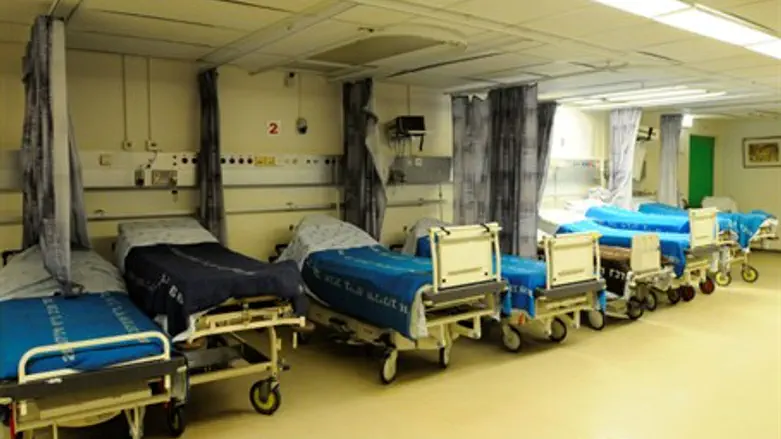
Israel is running out of hospital beds, the Ministry of Health reported Tuesday - with the number of beds per population declining 11% in nine years.
As of mid-2014, there were just 1.87 beds per every 1,000 people in Israel, compared to 1.91 in 2010 and 2.09 in 2005.
The Ministry of Health stated that the trend is "worrying," but did note that the decline appears to be slowing. That may be due, in part, to a government decision to add 960 beds to Israel's hospitals over several years in 2010.
A total of 699 beds were added over a four-year period, of which 157 were added in 2014 alone.
Of those, 238 beds were added to internal care wings, 69 to intensive care units, 149 to children's wards, 33 to operating rooms, 196 to surgery and 14 to recovery rooms.
By region, the statistics are as follows: 230 beds were added in the Jerusalem District; 125 to hospitals in Tel Aviv; 124 in the North; 91 in the South; 78 to Haifa-area hospitals and 51 to other hospitals in the Merkaz (Central) region.
But even that alone may not have helped the overall problem, according to Professor Arnon Afek, Director-General of the Ministry of Health.
"The downside is that there is still a decline in the number of beds per capita," he stated. "This is an alarming trend."
"On the other hand, we have begun to see more and more beds being added, as per the government's decision," Afek added. "This is a process that takes time to implement."
According to Afek, in May 2014 there were 15,290 beds for general care in Israeli hospitals - most of which (15,139) were for inpatients and just 151 for geriatric care.
And therein lies the problem, Afek says: there are not enough beds for Israel's elderly.
"While there is an increase in the younger population, at the same time we are witnessing an increase in the number of elderly patients who need hospitalization," Afek said. "Therefore, efforts to increase beds have just not been enough."
For the period from January to May 2014, there were 1,588 beds used on a standard day, of which 1,108 beds were given for general care patients, 303 for psychiatric outpatients, 105 for the chronically ill and 72 for patients in rehabilitation wards.
But while general admission in area hospitals remained stable, there has been an increase in emergencies: in May 2014 there were 1,174 admissions to ERs, compared to 68 in 2009.
As for mental health: in May 2014 there were 485 mental health patients in hospitals, unchanged from last year, of which 205 were in general care in hospitals and 280 were in public hospitals for mental health.